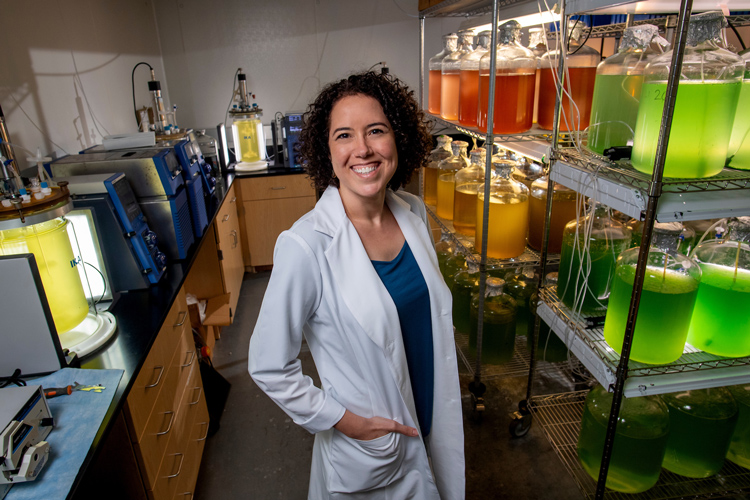UNCW Researcher to Receive $1 Million to Explore an Alternative Method to Produce Cement Using Microalgae

UNCW Research Professor Catharina Alves-de-Souza has been awarded a $1 million grant as part of more than $3 million in funding from the U.S. Department of Energy Advanced Research Projects Agency-Energy. The grant is part of the ARPA-E HESTIA program, which prioritizes overcoming barriers associated with carbon-storing buildings, including scarce, expensive and geographically limited building materials.
The HESTIA program aims to increase the total amount of carbon stored in buildings to create carbon sinks, which absorb more carbon from the atmosphere than is released during the construction process.
The project, “A Photosynthetic Route to Carbon-Negative Portland Limestone Cement Production,” will investigate an alternative method to generate cement that stores carbon dioxide (CO2) by using calcifying microalgae that capture CO2 in the form of limestone plates that cover their cells.
Dr. Alves-de-Souza will be a part of an interdisciplinary team comprising researchers from the University of Colorado Boulder and the National Renewable Energy Laboratory. The project is led by Dr. Wil Srubar, an architectural engineering and materials science associate professor at CU Boulder. Dr. Alves-de-Souza and Dr. Michael Guarnieri, senior scientist at the National Renewable Energy Laboratory, are co-principal investigators.
“This neutral-CO2 cement would be used to replace normal cement in concrete structures, which would contribute significantly to reducing the carbon footprint of the cement industry,” said Dr. Alves-de-Souza, director of the Algal Resources Collection at UNCW’s Center for Marine Science. “We will also obtain other high-value products from the microalgae, such as lipids and proteins, which will make the project economically viable.”
The project represents one of the more innovative and exciting examples of microalgal biotechnological applications, Dr. Alves-de-Souza added. “The proposed biotechnological approach offers a revolutionary pathway to produce, for the first time, CO2-neutral portland cement using microalgae. Nothing like that has ever been attempted before.”
“I am honored to be leading a world-class team of scientists and engineers at the University of Colorado Boulder and our partner institutions,” said Dr. Srubar. “Our partners bring deep expertise in microalgae cultivation and algal biomass valorization, along with advanced tools to help us select and optimize high-performing algal strains.”
The cement industry accounts for 7% of global anthropogenic carbon dioxide, most of which is released due to calcining (heating) quarried limestone, according to researchers.
“Concrete is an essential resource for climate-resilient construction, but the production of one of concrete’s main ingredients, portland cement, is energy-intensive and generates a large amount of carbon in the atmosphere,” said Dr. Stuart Borrett, associate provost for research and innovation at UNCW. “If successful, this research could have a positive impact on the Earth’s climate. UNCW is excited to partner with the University of Colorado Boulder to advance this important discovery and innovation effort.
The UNCW-ARC team will be responsible for screening hundreds of microalgae cultures to select the ones with characteristics for maximal growth and calcification. The team will also use existing knowledge of the normal functions and environment of the microalgae to optimize their growth conditions to produce the required volume of microalgae, said Dr. Alves-de-Souza. The NREL team will work on the genetic improvement of the coccolithophore microalgae to achieve maximal production.
“It’s not every day we have the opportunity to work with such a diverse research team, including engineers, microalgal specialists, geneticists and business specialists, all working toward a common goal,” said Dr. Alves-de-Souza. “As a scientist, this project represents a once-in-a-lifetime opportunity to generate basic knowledge that could be applied on a short-term scale to minimize global warming, one of the main threats to the planet.”
The innovative collaboration with CU Boulder is an excellent example of how science can help address major societal issues, said Dr. Kenneth Halanych, executive director of UNCW’s Center for Marine Science.
“Interdisciplinary collaborations can lead to truly transformative results. For this grant, Dr. Alves-de-Souza is combining her extensive knowledge of microalgae with the expertise of colleagues at the University of Colorado Boulder to do something simple, such as creating a more eco-friendly cement,” said Dr. Halanych. “Due to the common use of cement as a building material, this work has the potential to literally scale to global proportions and make a significant difference.”
This article has the following tags: myUNCW - Faculty & Staff Research & Innovation Academics


